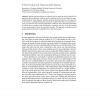Free Online Productivity Tools
i2Speak
i2Symbol
i2OCR
iTex2Img
iWeb2Print
iWeb2Shot
i2Type
iPdf2Split
iPdf2Merge
i2Bopomofo
i2Arabic
i2Style
i2Image
i2PDF
iLatex2Rtf
Sci2ools
IIS
2000
2000
Optimization and Interpretation of Rule-based Classifiers
Machine learning methods are frequently used to create rule-based classifiers. For continuous features linguistic variables used in conditions of the rules are defined by membership functions. These linguistic variables should be optimized at the level of single rules or sets of rules. Assuming the Gaussian uncertainty of input values allows to increase the accuracy of predictions and to estimate probabilities of different classes. Detailed interpretation of relevant rules is possible using (probabilistic) confidence intervals. A real life example of such interpretation is given for personality disorders. The approach to optimization and interpretation described here is applicable to any rule-based system.
Features Linguistic Variables | IIS 2000 | IIS 2001 | Linguistic Variables | Rule-based Classifiers |
Related Content
| Added | 01 Nov 2010 |
| Updated | 01 Nov 2010 |
| Type | Conference |
| Year | 2000 |
| Where | IIS |
| Authors | Wlodzislaw Duch, Norbert Jankowski, Krzysztof Grabczewski, Rafal Adamczak |
Comments (0)

